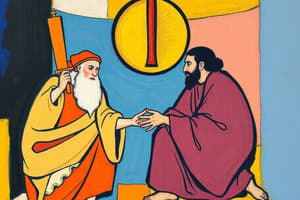Podcast
Questions and Answers
People began to study classical thought during the Renaissance to:
People began to study classical thought during the Renaissance to:
- Improve the Church
- Better themselves (correct)
- Earn money
- Earn respect
In The Divine Comedy, Dante Alighieri uses poetry to explore:
In The Divine Comedy, Dante Alighieri uses poetry to explore:
- The power of political turmoil
- The existence of life after death (correct)
- The complexity of human nature
- The simplicity of human nature
A Renaissance writer who applied humanistic principles to government was:
A Renaissance writer who applied humanistic principles to government was:
- Niccolo Machiavelli (correct)
- Miguel de Cervantes
- Dante Alighieri
- Francesco Petrarch
An early Renaissance thinker who studied and shared classical literature was:
An early Renaissance thinker who studied and shared classical literature was:
How did humanism affect paintings during the Renaissance?
How did humanism affect paintings during the Renaissance?
The Divine Comedy reflected Renaissance humanism by showing that:
The Divine Comedy reflected Renaissance humanism by showing that:
Well-educated people during the Renaissance learned:
Well-educated people during the Renaissance learned:
Which Renaissance writer also worked as an adviser, or courtier, to royalty?
Which Renaissance writer also worked as an adviser, or courtier, to royalty?
A major Renaissance work by Machiavelli was:
A major Renaissance work by Machiavelli was:
Which best states how the book Don Quixote reflected Renaissance humanism?
Which best states how the book Don Quixote reflected Renaissance humanism?
Flashcards
Renaissance study of classical thought
Renaissance study of classical thought
Renaissance thinkers studied classical literature, philosophy and art to better understand human potential and create a more vibrant society
Dante's Divine Comedy
Dante's Divine Comedy
A long poem exploring the journey of the human soul after death.
Machiavelli's humanism
Machiavelli's humanism
Machiavelli applied humanist principles by advocating for effective, practical governance
Francesco Petrarch
Francesco Petrarch
Signup and view all the flashcards
Humanism's impact on Renaissance paintings
Humanism's impact on Renaissance paintings
Signup and view all the flashcards
Human responsibility (Divine Comedy)
Human responsibility (Divine Comedy)
Signup and view all the flashcards
Renaissance education
Renaissance education
Signup and view all the flashcards
Castiglione's role
Castiglione's role
Signup and view all the flashcards
Machiavelli's 'The Prince'
Machiavelli's 'The Prince'
Signup and view all the flashcards
Don Quixote's humanism
Don Quixote's humanism
Signup and view all the flashcards
Study Notes
Renaissance Humanism
- Emphasis on studying classical thought for personal improvement during the Renaissance.
- Humanists believed in individual potential and the importance of human experience.
Dante Alighieri and The Divine Comedy
- Explores the existence of life after death using poetry.
- Reflects on the complexity of human nature, political turmoil, and moral choices.
Niccolò Machiavelli
- Applied humanistic principles to governance and politics.
- Author of "The Prince," a seminal work on political strategy and power.
Francesco Petrarch
- An early Renaissance thinker known for reviving classical literature.
- Advocated for the study of ancient texts and humanist values.
Impact on Art
- Renaissance paintings became more lifelike, reflecting a shift towards realism.
- Artists began to focus on human experience and the natural world, moving away from purely religious themes.
Responsibility and Choices
- The Divine Comedy suggests that individuals are responsible for their life choices.
- Humanism emphasizes personal accountability and moral responsibility in society.
Education in the Renaissance
- Well-educated individuals learned classical Latin to access ancient texts.
- Education shifted from medieval teachings towards classical works that embodied humanist ideals.
Baldassare Castiglione
- Worked as a courtier and adviser to royalty during the Renaissance.
- His writings reflect ideals of humanism in social and political life.
Don Quixote's Reflection of Humanism
- Miguel de Cervantes' "Don Quixote" illustrates the capability of individuals to do great things.
- Highlights the importance of personal dreams and aspirations in a changing society.
Studying That Suits You
Use AI to generate personalized quizzes and flashcards to suit your learning preferences.




